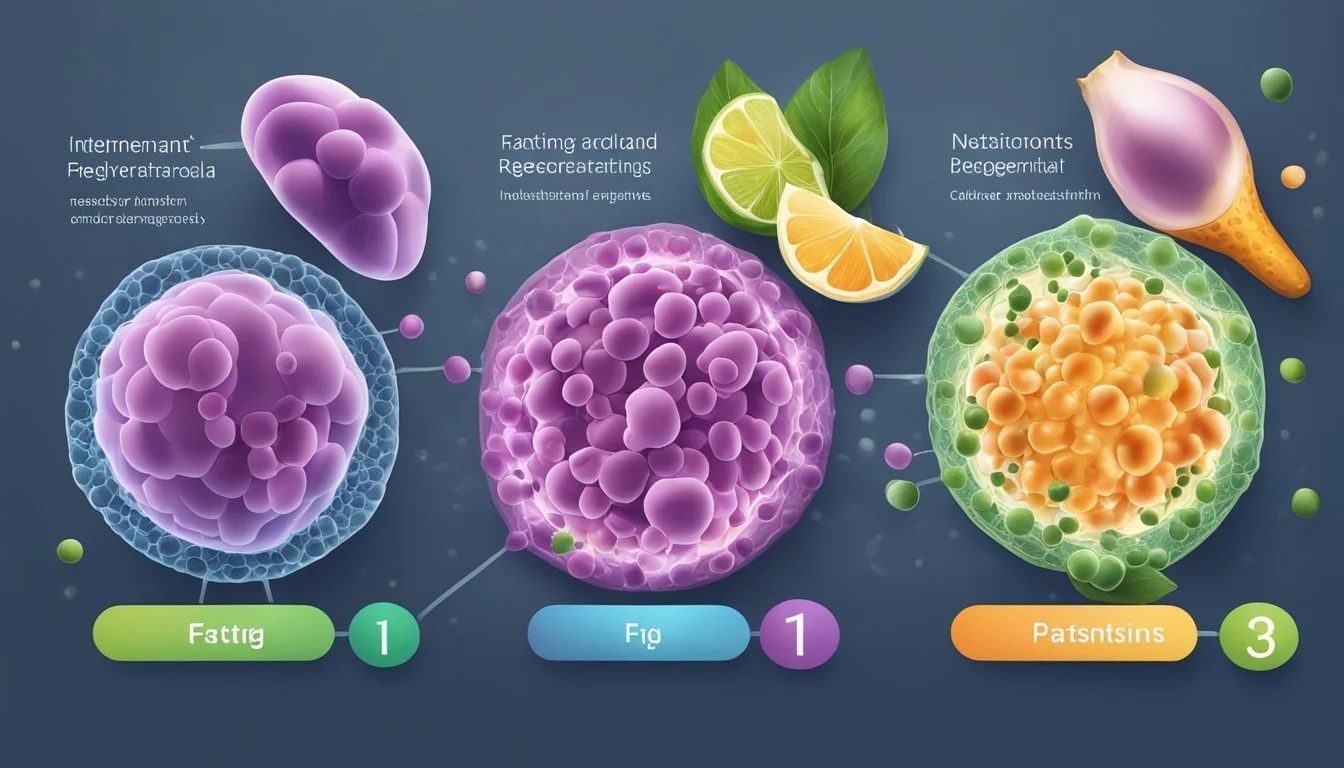Intermittent Fasting and Antioxidants
Enhance Your Immune Function Naturally
Intermittent fasting (IF) is a dietary approach that cycles between periods of eating and voluntary fasting. This time-restricted feeding method has gained popularity not only for weight loss but also for its potential health benefits. Emerging research suggests that IF may play a role in enhancing the body's antioxidant defenses—a key factor in preventing cellular damage and maintaining overall health.
Health benefits attributed to intermittent fasting extend beyond weight management. Studies indicate that IF can influence various metabolic processes that are conducive to health improvement. These include the regulation of blood glucose levels, improvement in lipid profiles, and even the modulation of blood pressure. By altering the timing of food intake, IF can also activate cellular pathways that promote an increase in the body's natural antioxidant production, thereby helping to combat oxidative stress.
While the mechanisms underlying the health benefits of intermittent fasting require further investigation, preliminary evidence points to its ability to strengthen the body's defense systems. The practice of IF may optimize the balance between reactive oxygen species production and the body's antioxidant capacity, leading to enhanced physiological resilience against environmental stressors and potentially lowering the risk of chronic diseases.
Fundamentals of Intermittent Fasting
Intermittent Fasting (IF) is a dietary approach where individuals cycle between periods of eating and fasting, with variations in the duration and frequency of these cycles. It's been linked to various health benefits, including improved metabolic health and immune modulation.
Concept and History of IF
Intermittent Fasting (IF) is a dietary pattern that alternates between periods of fasting and eating. The fundamental principle involves taking periodic breaks from food, thereby activating certain physiological responses. There are several methods of IF, each with its specific structure:
5:2 Method: This approach consists of eating normally for five days of the week and restricting calories to about 500-600 for the remaining two days.
16:8 Method: Commonly known as the time-restricted feeding protocol, it involves fasting for 16 hours of the day and eating all meals within the remaining 8-hour window.
Alternate Day Fasting: With this method, individuals alternate between days of normal eating and days where either no food is consumed or intake is significantly reduced.
The history of IF dates back centuries and has roots in various cultural, religious, and health practices around the world. The resurgence of IF in modern times can be attributed to its simplicity and emerging evidence of its health benefits.
Biological Mechanisms Behind Fasting
Fasting triggers a complex web of biological processes that tune and condition the body's metabolic and defense mechanisms. These processes are regulated by changes in hormone levels, gene expression, and energy utilization, leading to enhanced metabolic health and cellular repair.
Insulin and Blood Sugar Regulation
When an individual fasts, insulin levels decline, which in turn facilitates a reduction in blood sugar levels. This process is key to shifting the body's energy source from immediate glucose to stored fat. During fasting, cells become more sensitive to insulin, which can help in managing and preventing insulin resistance, a precursor to type 2 diabetes.
Fat Burning and Metabolism
Fasting increases fat burning, as the body switches to utilizing fat for its primary energy source, a state known as ketosis. This metabolic shift is not just about calorie restriction but also involves hormonal changes, including the rise of human growth hormone (HGH). Elevated levels of HGH accelerate fat burning and muscle growth and improve overall metabolic rate.
Cellular Repair and Autophagy
A crucial benefit of fasting is the activation of autophagy, a process where cells systematically recycle damaged components. This biological recycling bin helps reduce oxidative stress and clears out detrimental proteins that could lead to cellular dysfunction. Moreover, fasting can influence gene expression related to longevity and protection against disease.
Intermittent Fasting and Weight Management
Intermittent fasting is a dietary approach that alternates between periods of eating and fasting, which can lead to calorie restriction and subsequent weight loss.
Calorie Restriction and Weight Loss
Calorie restriction is the cornerstone of weight management strategies. Intermittent fasting facilitates reduced caloric intake without the need for tracking every meal. Through fixed eating windows and periodic food restriction, individuals consume fewer calories overall, leading to a deficit that promotes weight loss. Research indicates that intermittent fasting can lead to a weight reduction of approximately 1-8% from baseline, often visible within weeks of consistent practice.
Impact on Obesity and Body Weight
The impact of intermittent fasting extends beyond simple weight loss, particularly concerning obesity. By imposing scheduled eating periods, intermittent fasting helps regulate the body's energy utilization, enhancing its ability to burn fat. Studies observe consistent reductions in body weight and improvements in fat composition, particularly around the abdominal area. This is crucial for people struggling with obesity, as intermittent fasting can be an effective tool to aid in long-term body weight management and obesity reduction. The accumulating evidence suggests that aside from calorific reduction, intermittent fasting may alter hormonal levels, which further aids in weight loss and metabolic health.
Health Benefits and Disease Prevention
Intermittent fasting and antioxidants play significant roles in fortifying the body’s defenses against disease. They contribute to improved cardiovascular health, reduced cancer risk, and more effective diabetes management and prevention.
Cardiovascular Health
Intermittent fasting may enhance heart health by positively influencing cholesterol and blood pressure levels. Research suggests that this eating pattern can lead to:
A decrease in LDL cholesterol (the "bad" cholesterol), potentially lowering the risk of heart disease.
Reduction of blood pressure, mitigating strain on the heart and vascular system.
Cancer Risk Reduction
Antioxidants from a diet rich in fruits and vegetables, coupled with the effects of intermittent fasting, can contribute to:
Lowered oxidative stress and inflammation, which are factors associated with the development of cancerous cells.
A possibility of reducing cancer risk, as some studies indicate a link between fasting and a reduced occurrence of certain types of cancer.
Diabetes Management and Prevention
Intermittent fasting shows promise in the control and prevention of Type 2 Diabetes through:
Improved blood sugar levels by enhancing the body’s response to insulin.
Decreased insulin resistance, which can help in preventing the onset of diabetes.
By incorporating intermittent fasting and a diet rich in antioxidants, individuals may bolster their body's ability to combat disease through these key health improvements.
Nutritional Considerations During IF
When practicing intermittent fasting (IF), it's crucial to pay attention to the body’s nutritional needs during eating windows to maximize benefits and minimize discomfort.
Dealing with Hunger and Cravings
Individuals may experience hunger and cravings during IF, particularly in the initial stages as the body adjusts to the new eating pattern. It's essential to stay hydrated by drinking plenty of water, as the sensation of thirst can often be mistaken for hunger. Additionally, consuming foods high in fiber such as fruits and vegetables can help one feel satiated for longer periods. These foods also provide essential vitamins and nutrients necessary for overall health.
Safely Incorporating IF into Your Diet
To incorporate IF safely, one should consult with a dietitian to tailor the eating plan to individual needs, especially when medications or underlying health conditions are in play. The diet during feeding periods should be balanced, including adequate amounts of lean protein, healthy fats, and complex carbohydrates for sustained energy. It is important to avoid overindulgence immediately after a fast to prevent discomfort like headaches or gastrointestinal issues. Here’s a structured approach to ensure nutritional adequacy:
Lean Protein: Chicken, fish, tofu, or legumes
Healthy Fats: Avocado, nuts, seeds, or olive oil
Complex Carbohydrates: Whole grains and starchy vegetables
Fruits & Vegetables: A variety of colors to ensure a range of nutrients
A diet rich in these components supports a person's immune health, as indicated by the Institute for Functional Medicine, and can aid in making IF both a safe and effective approach to wellness.
Psychological and Physical Effects
Intermittent fasting (IF) has been investigated for its potential impacts on psychological well-being and physical health. This section explores the cognitive benefits and the influence of IF on physical performance.
Cognitive Benefits
Studies suggest intermittent fasting can positively influence brain health and cognitive function. By enhancing neuronal plasticity and reducing oxidative stress, IF may promote the growth and development of nerve cells, leading to improved brain function. Time-restricted feeding, in particular, has been associated with better memory and learning outcomes.
Influence on Physical Performance
Physical performance, including muscle tone and endurance, can be influenced by intermittent fasting. IF has been shown to benefit physical fitness by potentially improving muscle efficiency and energy metabolism, which could aid in maintaining muscle tone. Additionally, fasting might promote the repair and regeneration of tissues, which is essential for sustained physical performance.
Risks and Contraindications
Intermittent fasting may offer numerous health benefits, but it isn't suitable for everyone. Certain individuals should avoid it due to potential risks to their health and well-being.
When to Avoid Intermittent Fasting
Pregnant Women: Women who are pregnant require consistent nutrition to support fetal development. Intermittent fasting can disrupt the necessary energy and nutrient intake, potentially leading to complications.
Individuals with Eating Disorders: Those with a history of eating disorders like anorexia or bulimia may find intermittent fasting triggering. The structured eating windows could exacerbate disordered eating patterns.
Those with Liver Disease: The liver plays a crucial role in metabolism and energy storage. Intermittent fasting could impose additional stress on the liver, especially in the presence of liver disease.
Participants in Clinical Trials: Individuals involved in clinical trials should consult their trial supervisor before starting intermittent fasting. It could interfere with study results related to dietary or pharmaceutical interventions.
Important Note: Individuals should consult with healthcare professionals before making significant dietary changes, especially if they have underlying health conditions or are taking medication.
Comparative Analysis of IF Plans
This section presents a focused examination of two popular Intermittent Fasting (IF) methods: the 5:2 approach and the 16:8 method, alongside a comparison between Alternate-Day Fasting and Time-Restricted Feeding, providing details on their specific protocols and potential differences in their effectiveness.
5:2 Method vs. 16:8 Method
5:2 Diet:
Frequency: 2 non-consecutive days of significant calorie reduction per week.
Intake on Fasting Days: Typically 500-600 calories.
Remaining Days: No strict dietary restrictions; normal eating patterns.
16:8 Method:
Frequency: Daily fasting.
Fasting Window: 16 hours of fasting with an 8-hour eating window (e.g., eating only from noon to 8 PM).
Diet: No specific calorie restrictions during the eating window, but healthy eating is encouraged.
While both the 5:2 diet and the 16:8 method are forms of intermittent fasting, they differ primarily in frequency and duration of fasting periods. The 5:2 approach allows for more flexibility on non-fasting days, while the 16:8 method imposes a strict daily schedule. The choice between these two may come down to individual preferences and lifestyle compatibility.
Alternate-Day Fasting vs. Time-Restricted Feeding
Alternate-Day Fasting:
Fasting Days: Typically involves a full 24-hour fasting period followed by a day of regular eating, or very low-calorie consumption on fasting days.
Non-Fasting Days: No strict dietary restrictions; normal eating patterns.
Time-Restricted Feeding:
Daily Pattern: Involves eating all daily meals within a certain time frame each day (e.g., a 6-10 hour window).
Outside Eating Window: No caloric intake permissible.
Alternate-Day Fasting offers a pattern of 24-hour fasts, which may be more challenging to maintain compared to the consistent daily routine found in Time-Restricted Feeding. The selection between these plans might be influenced by individual metabolic responses, goals, and daily routine feasibilities.
Emerging Research and Future Directions
This section focuses on the long-term implications of intermittent fasting (IF) and the exciting new research areas that are shaping our understanding of how IF may contribute to health and longevity.
Long-Term Effects of IF
Long-term studies on IF are crucial to understanding its sustained impact on health. A key focus in examining the long-term effects is metabolic health, specifically how IF influences metabolism and the body's ability to switch energy sources during fasting periods, known as metabolic switching. Research published in the New England Journal of Medicine has hinted at IF's potential to enhance lifespan and reduce the incidence of age-related diseases. However, definitive conclusions await results from more comprehensive clinical trials.
When considering diseases such as cardiovascular ailments and cancers, the need for longitudinal data is paramount. The National Institute on Aging (NIA) supports studies that explore whether IF can improve cardiovascular health and decrease cancer risk over an extended period. Current animal research suggests a positive trend, but translating these findings to humans requires more rigorous and controlled investigations.
New Frontiers in IF Research
The exploration of IF's benefits is expanding into new branches of medicine. Neurological disorders represent one of these frontiers, with studies investigating if IF can play a role in neuroprotection and cognitive function enhancement. Anti-aging research, too, looks at IF’s impact on various biological markers associated with aging, aiming to distinguish between actual life span extension versus health span improvement.
Emerging clinical trials are now incorporating antioxidants alongside IF to evaluate their combined effects on the human body's defenses. These studies consider not just external antioxidant supplementation, but also how IF might inherently boost the body's own antioxidant capabilities. The interaction between IF, the increase of endogenous antioxidants, and overall metabolic health continues to be an area ripe for discovery.
Lifestyle Integration and Maintenance
Integrating intermittent fasting (IF) into daily life and maintaining this practice requires a commitment to adopting certain habits and pairing IF with nutritious dietary patterns. By doing so, individuals may enhance their body's defenses through better management of calorie intake and timing of meals.
Developing Sustainable IF Habits
One critical aspect for successfully integrating IF into an individual's lifestyle is the establishment of sustainable habits. Consistency is key; setting a regular fasting window can help regulate the body's internal clock, potentially reducing visceral fat and improving cholesterol levels. Individuals can start with shorter fasting periods and gradually increase the duration as their body adapts to ensure longevity of the practice.
Incorporating IF with Other Dietary Patterns
IF can be synergistic with other dietary patterns, most notably, the Mediterranean-Style Diet, which emphasizes consumption of fruits, vegetables, whole grains, and healthy fats. To optimize antioxidant intake, individuals should plan their eating windows to include such nutrient-dense foods. Careful consideration of calorie intake and avoiding unnecessary snacking, especially outside of designated eating times, further aligns IF with the goal of metabolic improvement. Timely eating, aligned with circadian rhythms, may also amplify the benefits of IF, leading to more pronounced effects on health markers such as cholesterol levels.
Conclusion
Intermittent fasting (IF) is a dietary strategy characterized by periods of voluntary abstinence from food and drink. Multiple studies suggest that IF can be a powerful tool in enhancing the body's defenses, particularly through the modulation of the immune system and reduction of inflammation.
Health Benefits: Research indicates that IF may lead to weight loss, improved regulation of glucose and lipid metabolism, and decreased blood pressure.
Benefits of Intermittent Fasting: There is accumulating evidence that supports IF in the reinforcement of antioxidant defenses, which plays a crucial role in combating oxidative stress associated with various diseases.
Reduced Inflammation: The practice has been linked to the reduction of chronic inflammation, which is a risk factor for a range of conditions including heart disease, arthritis, and asthma.
Table 1: Potential Health Benefits of Intermittent Fasting
Benefit Description Weight Management Assists in body weight regulation through periods of food abstinence Metabolic Health Improvement Enhances glucose and lipid profiles Blood Pressure Reduction May contribute to lower blood pressure levels Immune System Modulation Supports immune function through waste removal and cellular repair Inflammation Decrease Reduces markers of inflammation, protecting against chronic diseases
The relationship between IF and reduced risk factors for heart disease is particularly noteworthy. IF has the potential to improve heart health by affecting risk factors such as obesity, hypertension, and dyslipidemia. Despite the promising results, it is important for individuals to approach IF with careful consideration, tailoring it to their specific health needs and circumstances, and preferably under professional guidance. The benefits of IF represent a promising, yet carefully balanced, approach to enhance overall health and reduce certain disease risks.










